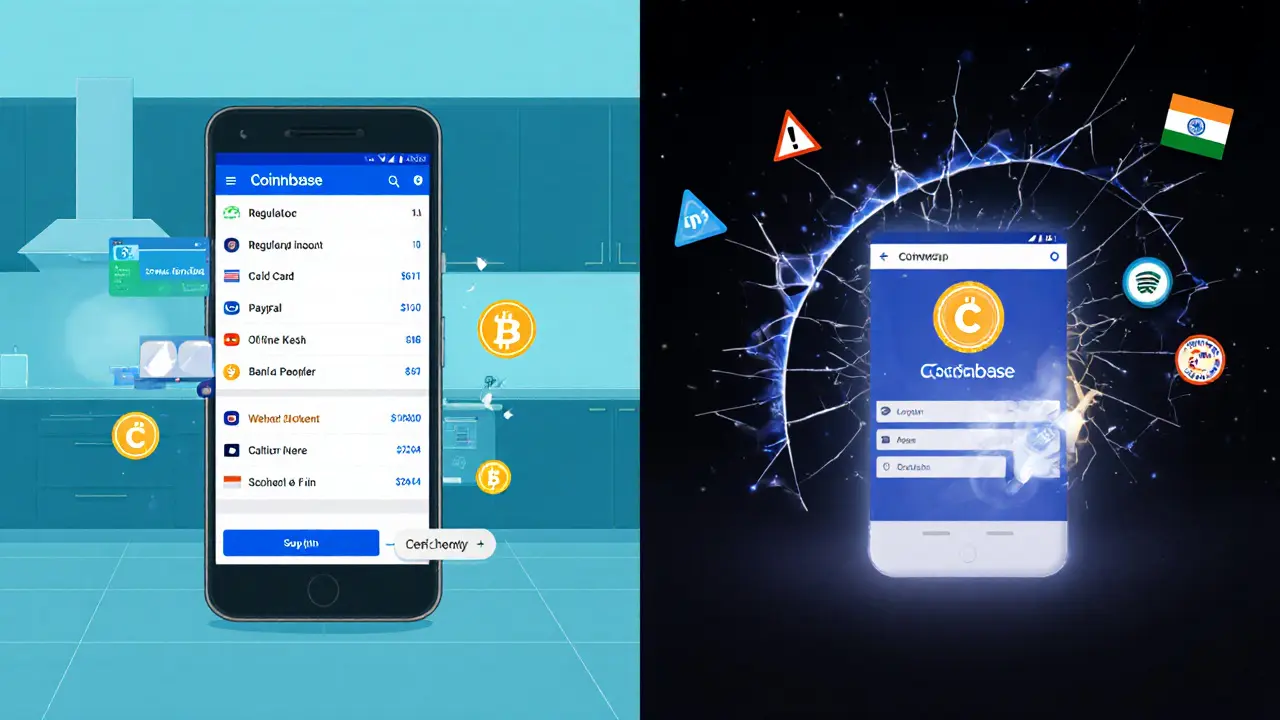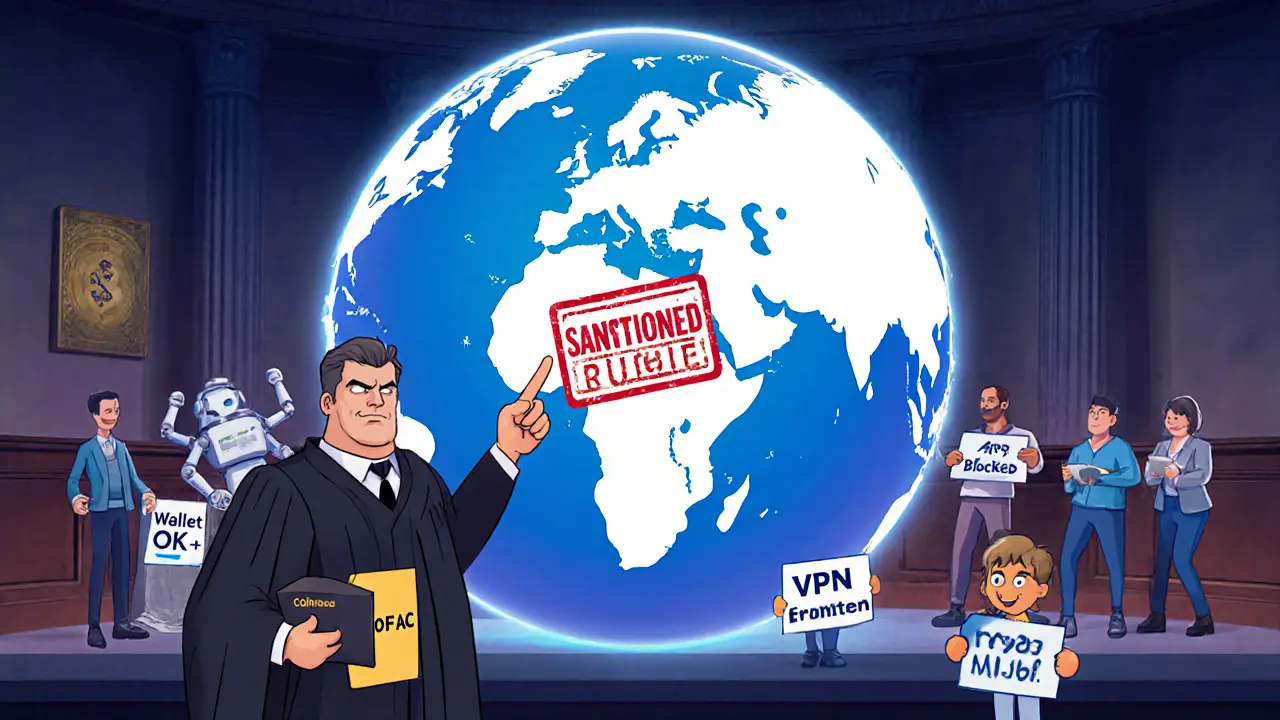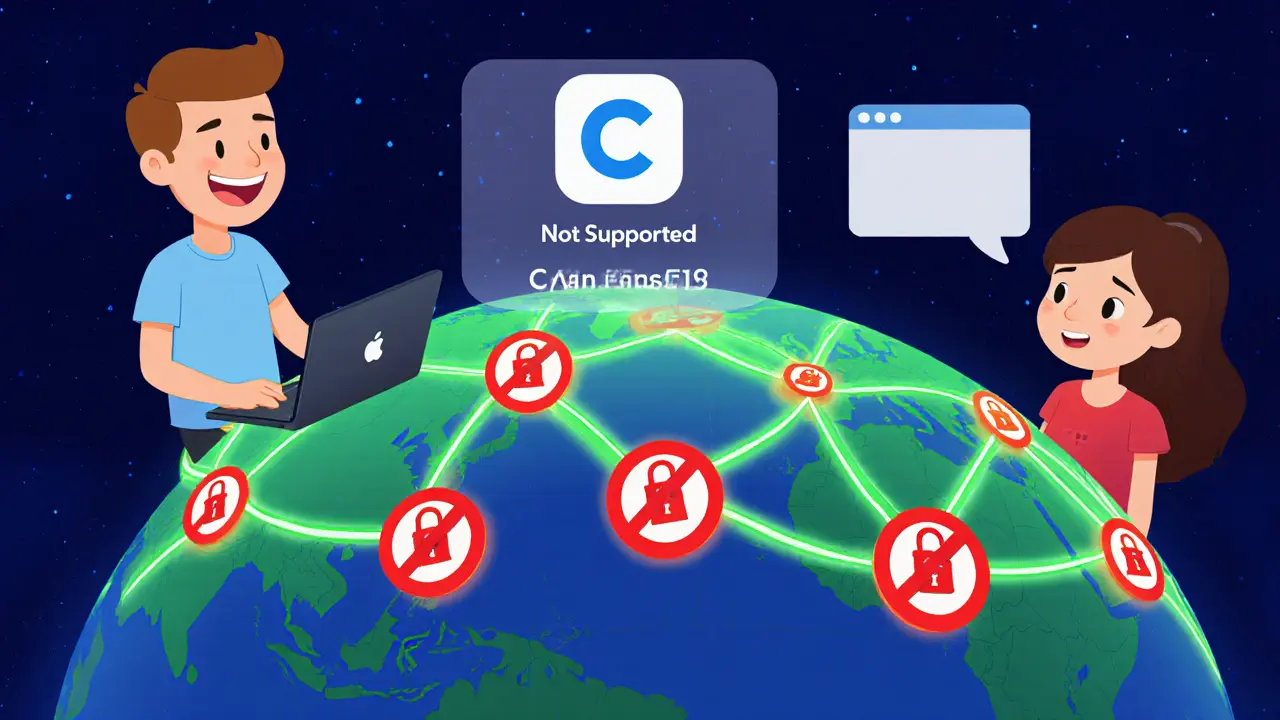Coinbase Country Access Checker
Check Your Country's Coinbase Access
Enter a country to check access status
How This Works
Coinbase restricts services based on regulatory compliance and sanctions. This tool shows if your country has full access to:
- ✅ Full Coinbase App - Buy/Sell with fiat (USD, EUR, GBP, etc.) and bank transfers
- ❌ Limited Wallet Only - Can store and send crypto but not buy with card or bank
- ❌ Not Supported - No access to any Coinbase services
Why Coinbase Blocks Access in Some Countries
If you’ve tried signing up for Coinbase and got a message saying your country isn’t supported, you’re not alone. Millions of people around the world face the same issue. The reason isn’t random-it’s legal. Coinbase doesn’t pick which countries to serve based on popularity or demand. It follows strict rules set by governments and financial regulators, especially in the U.S. and Europe.
As a publicly traded company (NASDAQ: COIN), Coinbase must comply with U.S. Treasury rules like OFAC sanctions. That means if a country is on the sanctions list-like Russia, Iran, Syria, or North Korea-Coinbase can’t offer any services there, not even a wallet. Even if you have a valid ID and a bank account, your location is checked through your IP address and government-issued documents. If it doesn’t match, your account gets blocked or shut down.
But here’s the twist: Coinbase Wallet works differently than the main Coinbase app. The Wallet lets you store and send crypto anywhere in the world-except those same sanctioned countries. You can connect to DeFi apps, trade tokens, and use dApps. But you can’t buy crypto with a credit card or bank transfer. That’s only available through the Coinbase app, and that’s where the real restrictions kick in.
Where You Can Use Coinbase’s Full Features
Right now, you can deposit and withdraw fiat money (like USD, EUR, GBP) using the Coinbase app in 48 countries. That includes the U.S., Canada, the U.K., Germany, France, Australia, Japan, and Singapore. These are all places with clear, stable crypto regulations that Coinbase has spent years getting licensed for.
In the U.S., Coinbase is registered as a money transmitter in all 50 states and works directly with banks for ACH transfers. In Europe, it’s fully licensed under MiCA (Markets in Crypto-Assets), the new EU crypto law that came into effect in 2025. That’s why users in Germany, the Netherlands, and Spain can deposit €10,000 via SEPA in under two hours.
Transaction limits vary by verification level. Unverified users can only send $500 per day. Fully verified users with ID and proof of address can send up to $50,000 daily. Apple Pay, Google Pay, and PayPal are supported in most of these countries. But even within supported regions, some features are limited. For example, Cardano (ADA) staking isn’t available in 12 EU countries due to MiCA’s transitional rules.
Where Coinbase Doesn’t Work-And Why
There are 63 countries where you can’t use Coinbase’s fiat services at all. That includes places like Pakistan, the Philippines, Nigeria, Egypt, and the UAE. In Pakistan, for example, over 200,000 people trade crypto daily on Binance P2P. But on Coinbase, you can only download the Wallet app. No bank transfers. No debit cards. No PayPal. Users there report paying up to 8% extra fees on peer-to-peer platforms just to buy Bitcoin.
The Philippines is another big one. Over 80% of crypto users there want to buy crypto with pesos. But Coinbase doesn’t support local banks or payment methods. Instead, users turn to local exchanges like PDAX, which charge 3.5% per trade-seven times higher than Coinbase’s 0.5% fee.
Even in places like the UAE, where crypto is technically legal, Coinbase only allows Apple Pay deposits. Bank transfers are blocked. Why? Because the UAE doesn’t have a formal licensing agreement with Coinbase’s legal entity. So they offer a partial service-just enough to avoid legal risk, but not enough to be useful for most people.
Russia is completely cut off. Since February 2022, no fiat services have been available. Even if you’re a Russian citizen living abroad, if your ID shows a Russian address, you’re blocked. Same for Crimea, which is permanently excluded under U.S. sanctions.

Wallet vs App: The Hidden Difference
Many users don’t realize there are two different products. The Coinbase App is a custodial exchange. That means Coinbase holds your crypto for you. It’s built for buying, selling, and trading with real money. It’s regulated, secure, and fast-but only in approved countries.
The Coinbase Wallet is non-custodial. You control your keys. It’s a browser extension and mobile app that connects to Ethereum-based networks. It supports over 5,500 tokens and works in 190+ countries. But you can’t buy crypto with a credit card. You have to transfer crypto from another exchange or wallet first.
If you’re in India, you can’t use the Coinbase App. The Reserve Bank of India hasn’t approved it, and Coinbase hasn’t completed registration. But you can install the Wallet and connect it to Uniswap or Aave. You just need to send Bitcoin or Ethereum from Binance or Kraken first.
This split lets Coinbase serve users in restrictive markets without breaking the law. But it also creates confusion. People think if the Wallet works, the App should too. It doesn’t. And trying to bypass it with a VPN can get your account permanently closed.
What Happens If You Use a VPN
Some users try to get around restrictions by using a Virtual Private Network (VPN). They change their IP address to look like they’re in the U.S. or Germany. It seems like a simple fix. But it’s a big risk.
Coinbase’s system checks multiple signals: IP address, device fingerprint, bank account details, government ID, and even typing patterns. If any of them don’t match, the system flags it. In March 2025, a user in the UAE lost $2,300 after using a VPN to access the App. Their account was frozen, then permanently terminated. No appeal. No refund.
Even if you don’t get caught right away, Coinbase can retroactively close accounts if they later discover location fraud. The User Agreement clearly states that using the service from an unsupported country is a violation. And they don’t need to prove you meant to cheat-they just need to prove you did it.
There’s no gray area here. If you’re in a restricted country, don’t try to trick the system. You’re not saving money-you’re risking your funds.

How Coinbase Compares to Other Exchanges
Compared to other exchanges, Coinbase is one of the most restricted. Kraken operates in 190+ countries with fiat access in 55. Binance offers fiat services in over 100 countries, including Pakistan and Nigeria, even if those markets are legally shaky.
But Coinbase’s restrictions come with a trade-off: safety and legitimacy. In the U.S., Coinbase holds 56% of the retail crypto market because it’s the only major exchange registered with the SEC. If you’re in Germany, it’s the only one with full BaFin approval. That’s why banks and financial institutions trust it.
Decentralized wallets like MetaMask have no geographic limits. You can use them anywhere. But they don’t let you buy crypto with a credit card. You need to already have crypto. That’s why many users start on Binance or Kraken, then move funds to MetaMask or Coinbase Wallet for long-term storage.
So if you’re looking for convenience and low fees, Coinbase is great-if you’re in the right country. If you’re not, you’ll need to use another platform to buy, then move your crypto to Coinbase Wallet for safekeeping.
What’s Changing in 2025 and Beyond
Regulations are shifting fast. MiCA in Europe is now live, which means Coinbase had to split its European operations. Users in Malta, Iceland, Liechtenstein, and Hungary now deal with Coinbase Luxembourg S.A. instead of Coinbase Europe Limited. That’s a technical change, but it affects how support works and which rules apply.
In India, Coinbase is still trying to get registered with the RBI. If they succeed, they might launch fiat services in 2025. But if they fail, the block stays. Same in Nigeria and Egypt-both added to the restricted list in early 2025 after new crypto laws were passed.
Meanwhile, the SEC lawsuit against Coinbase is still ongoing. If the court rules that Coinbase’s crypto tokens are securities, it could force even more restrictions. The company has $6.2 billion in regulatory reserves to handle this, but it’s not infinite.
Some experts warn that this patchwork of country-by-country access could shrink Coinbase’s market by 40% by 2030. Others say it’s the only way to survive in a world where governments are cracking down on unregulated finance.
What You Can Do If You’re Blocked
If you’re in a country where Coinbase doesn’t offer fiat services, here’s what actually works:
- Download Coinbase Wallet-it’s free and works almost everywhere.
- Use another exchange (like Binance, Kraken, or a local one) to buy crypto with your local payment method.
- Send that crypto to your Coinbase Wallet address.
- Use the Wallet to stake, swap, or hold your assets safely.
You won’t get the convenience of buying crypto with your debit card, but you’ll still have full control over your money. And you won’t risk losing your account.
Check Coinbase’s official Country Restrictions Page for the latest list. It’s updated every month. Don’t rely on Reddit or forums-they’re often outdated.
Why can’t I use Coinbase in my country?
Coinbase can’t offer services in your country because of local laws or U.S. sanctions. Even if crypto is legal where you live, Coinbase must follow U.S. Treasury rules (OFAC) and European regulations (MiCA). If the country is on a sanctions list or hasn’t approved Coinbase’s legal status, they’re legally blocked from offering fiat deposits or withdrawals.
Can I use Coinbase Wallet in a restricted country?
Yes. Coinbase Wallet is non-custodial and works in almost every country except those under strict OFAC sanctions (like Russia, Iran, Syria). You can store, send, and swap crypto using the Wallet. But you can’t buy crypto with a bank card, PayPal, or Apple Pay. You need to transfer crypto from another exchange first.
Is it safe to use a VPN to access Coinbase?
No. Using a VPN to bypass geographic restrictions violates Coinbase’s User Agreement. Their system detects IP mismatches, device changes, and document inconsistencies. If caught, your account can be frozen or permanently closed-with no way to recover funds. Many users have lost thousands this way. It’s not worth the risk.
What’s the difference between Coinbase App and Coinbase Wallet?
The Coinbase App is a regulated exchange where Coinbase holds your crypto. You can buy, sell, and trade with fiat money-but only in approved countries. The Coinbase Wallet is a self-custody tool. You control your keys. You can’t buy crypto with a card, but you can store, send, and use crypto on DeFi apps. It works globally, except in sanctioned countries.
Why is Cardano staking blocked in some EU countries?
Under MiCA (Markets in Crypto-Assets), staking services are treated like financial products and require extra licensing. In 12 EU countries, Coinbase hasn’t completed the required compliance steps for Cardano staking yet. It’s not a technical issue-it’s a legal one. The restriction will likely lift once they get approval, but there’s no set timeline.
Can I open a Coinbase account if I’m a citizen of a restricted country but live elsewhere?
Yes, but only if you can prove your current residence. Coinbase requires proof of address (like a utility bill or bank statement) that matches your ID and IP location. If you’re a U.S. citizen living in Thailand with a Thai address and bank account, you can sign up using your Thai details. But if your ID shows a Russian address, even if you’re traveling, you’ll be blocked.
Does Coinbase plan to expand to more countries?
Coinbase is slowly expanding, but only where regulations allow. They’re currently working on registration in India and considering new markets in Southeast Asia. But they won’t enter countries with unclear or hostile crypto laws. Their strategy is to be safe, not fast. Expect new countries to be added one by one, not all at once.

Brian Gillespie
November 12, 2025 AT 20:42Adrian Bailey
November 14, 2025 AT 11:27Ainsley Ross
November 14, 2025 AT 17:43And yes, the Wallet is the real hero here. It lets people in restricted regions participate in DeFi without crossing any lines. That’s innovation within boundaries. Respect.
Joanne Lee
November 16, 2025 AT 12:28Arthur Crone
November 17, 2025 AT 03:55Rebecca Saffle
November 17, 2025 AT 05:17BRYAN CHAGUA
November 19, 2025 AT 04:13Rachel Everson
November 20, 2025 AT 17:04Johanna Lesmayoux lamare
November 22, 2025 AT 11:19ty ty
November 22, 2025 AT 12:51Wayne Dave Arceo
November 24, 2025 AT 10:14